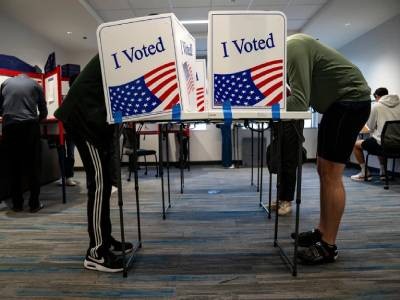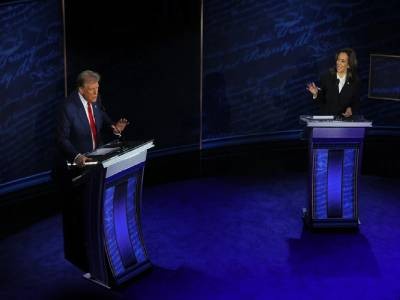Soon-to-be US president Donald Trump (left) and his vice-president, J.D. Vance, at an election night watch party.Credit: Evan Vucci/AP Photo/Alamy
Scientists around the world expressed disappointment and alarm as Republican Donald Trump won the final votes needed to secure the US presidency in the early hours of 6 November. On account of Trump’s anti-science rhetoric and actions during his previous term in office, many are now bracing for four years of attacks on scientists, both in and outside the government.
The US election is monumental for science, say Nature readers — here’s why
“In my long life of 82 years … there has hardly been a day when I felt more sad,” says Fraser Stoddart, a Nobel laureate who left the United States last year and is now a member of the chemistry department at the University of Hong Kong. “I’ve witnessed something that I feel is extremely bad, not just for the United States, but for all of us in the world.”
Michael Lubell, a physicist at the City College of New York in New York City who tracks federal science-policy issues, says that given how polarized US politics are right now, he is “shocked, but not surprised” by the result. The implications of the win for both government policy and science are profound, especially because of Trump’s deep scepticism of scientists and other specialists who manage public health and environmental policy in the federal government, Lubell says.
Votes are still being counted in many places, but Trump has already won enough US states to sail to a resounding victory over his Democratic opponent, US vice-president Kamala Harris. Trump addressed his supporters as the victor early today, declaring his coalition “the greatest political movement of all time”.
Republicans also look primed to win the upper chamber of the US Congress — the Senate — flipping at least three Democratic seats, although there are four other competitive races that have yet to be called for either party. Results for the lower chamber, the US House of Representatives, are still coming in, and it could be days or weeks before the final numbers are known, but it seems likely that the Republicans will retain control. This would give Trump and his party full control of government in Washington DC.
“We need to be ready for a new world,” says Grazyna Jasienska, a longevity researcher at Jagiellonian University in Krakow, Poland. “I am trying to be optimistic, but it is hard to find any positive aspects for global science and public health if Republicans take over.”
Worries pour in
Trump has, in the past, called climate change a hoax and pulled the United States out of the Paris climate agreement. He has also said he would give Robert F. Kennedy Jr, a political figure who has questioned vaccine safety, a “big role” in his administration, and he has promised to make it easier to fire specialists, such as scientists, from the US government if they oppose his political agenda.
The US is the world’s science superpower — but for how long?
Worries pouring in this morning align with those expressed by the majority of readers who responded last month to a survey conducted by Nature. More than 2,000 people answered the poll, with 86% saying that they favoured Harris, owing to concerns including climate change, public health and the state of US democracy. Some even said they would consider changing where they live or study if Trump won.
Responses geared towards that sentiment have come swiftly in the wake of Trump’s win. Tulio de Oliveira, a prominent virologist at the Centre for Epidemic Response and Innovation at Stellenbosch University in South Africa, posted on X (the social-media platform formerly known as Twitter): “With the changes around the world, you may want to relocate to one of the best Universities in [South Africa] in one of the world’s most beautiful region!” He also posted a link to job advertisements for postgraduate and postdoctoral fellowships at the university.
Not all researchers are against a Trump presidency, however. Of those who responded to Nature’s reader survey, 6% expressed a preference for Trump — usually citing concerns about security issues and the economy. César Monroy-Fonseca, chief scientific officer at Seele Neuroscience, a behavioural neuroscience laboratory based in Mexico City, favoured Trump, telling Nature that he is “the lesser of the evils”. The Mexican economy is strongly dependent on decisions made by the US government, Monroy-Fonseca says.
Another reader who agreed to be contacted but did not want their name to be used, said they are concerned about Trump’s hostility towards science and evidence. But the respondent, a long-time nurse from Wilmington, North Carolina, said they would vote for Trump because, “at the end of the day, I want to be safe, and I want to be able to take care of my family”.
Lessons learnt
Others, however, are focused on what a second Trump presidency will mean for science. “Perhaps one of my biggest worries … is that Trump will be another nail in the coffin for trust in science”, given his anti-science rhetoric, says Lisa Schipper, a geographer at the University of Bonn in Germany who specializes in climate-change vulnerability. According to a survey of thousands of US adults by the Pew Research Center in Washington DC, the percentage of people who say that science has had a positive effect on society has been declining steadily since 2019.
US election debate: what Harris and Trump said about science
“I’m speechless, but I think it’s a learning moment,” says Sheila Jasanoff, a social scientist at Harvard University in Cambridge, Massachusetts. Trump’s victory illustrates a fundamental disconnect between academic researchers and many Republican voters. Finding common ground will require social engagement, and probably humility on the part of scientists, who have yet to fully come to grips with this social and political divide. For many Republicans, Jasanoff says, “the problem is us” — the academic ‘elites’.
Some have already begun to think about January 2025, when Trump is slated to take office. “I hope we can convince the Trump administration to adopt a bold evidence-based science agenda and to hire people who are skilled and competent to implement it,” says Georges Benjamin, the executive director of the American Public Health Association in Washington DC. But the last time Trump was in office, Benjamin adds, “he had some absolutely amazing scientists who worked for him, and then he undermined them — he didn’t follow their advice” — in particular, by publicly rebuking them and not pushing a strong response to the COVID-19 pandemic.
“Starting now, we are going to need brave people, people willing to push back, protect the vulnerable, and do what’s right over what’s easy,” says one senior official at the US Environmental Protection Agency who declined to be named because of fears of retribution under the forthcoming Trump administration. “We do have to remember what’s right. And what’s right is protecting public health and the environment.”



